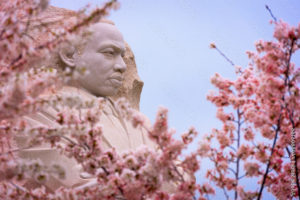
Retracing the footsteps of Dr. Martin Luther King, Jr., Summit Academy School – Lorain students are taking a virtual journey of the Civil Rights Movement. In recognition of Martin Luther King, Jr. Day, sixth- and seventh-grade students in Michelle Gilmore’s history class will intersect with the people, events and milestones of the pivotal 1954–1968 movement to end segregation, Black voter suppression, and discriminatory employment and housing practices in the United States.
Their journey begins with Mahatma Gandhi and the Great Salt March, opening the door for students to understand the connection between Gandhi and MLK, according to Gilmore. While the two altruistic leaders never met, they shared a common thread: nonviolent social change.
The students will continue their voyage exploring the Montgomery Bus Boycott, the 1963 March on Washington, the Selma to Montgomery March and the Voting Rights Act of 1965. Fast-forwarding to current times, the students will end their trip by learning about continuing efforts for equality in America, Gilmore says.
The robust lessons include videos, images, passages, exercises and writing activities to engage students as they learn about Dr. King. Gilmore adds that the students will exercise their history and reading skills as they study Dr. King and the Civil Rights Movement on their impactful journey.
“Lessons like these, which incorporate stories from America’s past, are indeed poignant today,” says Interim Director and Literacy Coach Amy Smialek. “We need to know about transitions from the past to understand our present … to hear the harmony in America’s song of equality from the mouths of historic figures, like Dr. Martin Luther King, Jr., in order to guide our country to a future of civil peace.”
Also at Summit Academy School – Lorain, students in Aaron Kodman’s high school history class will analyze a portion of Martin Luther King Jr.’s speech “I’ve Been to the Mountaintop.” Kodman says his students will discuss such questions as:
What does Dr. King mean by “being true to what is written on paper?”
Why is Dr. King’s list referring to “somewhere I read” important, and how does it connect to “what is written on paper?”
Why are the dictatorships around the world, which Dr. King references, important to his speech?
Did Dr. King have a premonition of the events that would soon take his life?
“As a class we will compare his words to the life of Moses and his ability to see the Promised Land, but not enter it,” explains Kodman. He adds that students will then discuss the Promised Land Dr. King described and examine what it would take to get there during this profound lesson.
These lessons, in recognition of Dr. Martin Luther King, Jr. Day, help allow the school community to walk in others’ shoes to find empathy and compassion instead of judgment and division, explains Smialek.
“The students of Summit Academy Schools yearn for empathy and compassion, and Summit Academy teachers have the opportune position to use their voices in the classroom to promote peace,” she says.
